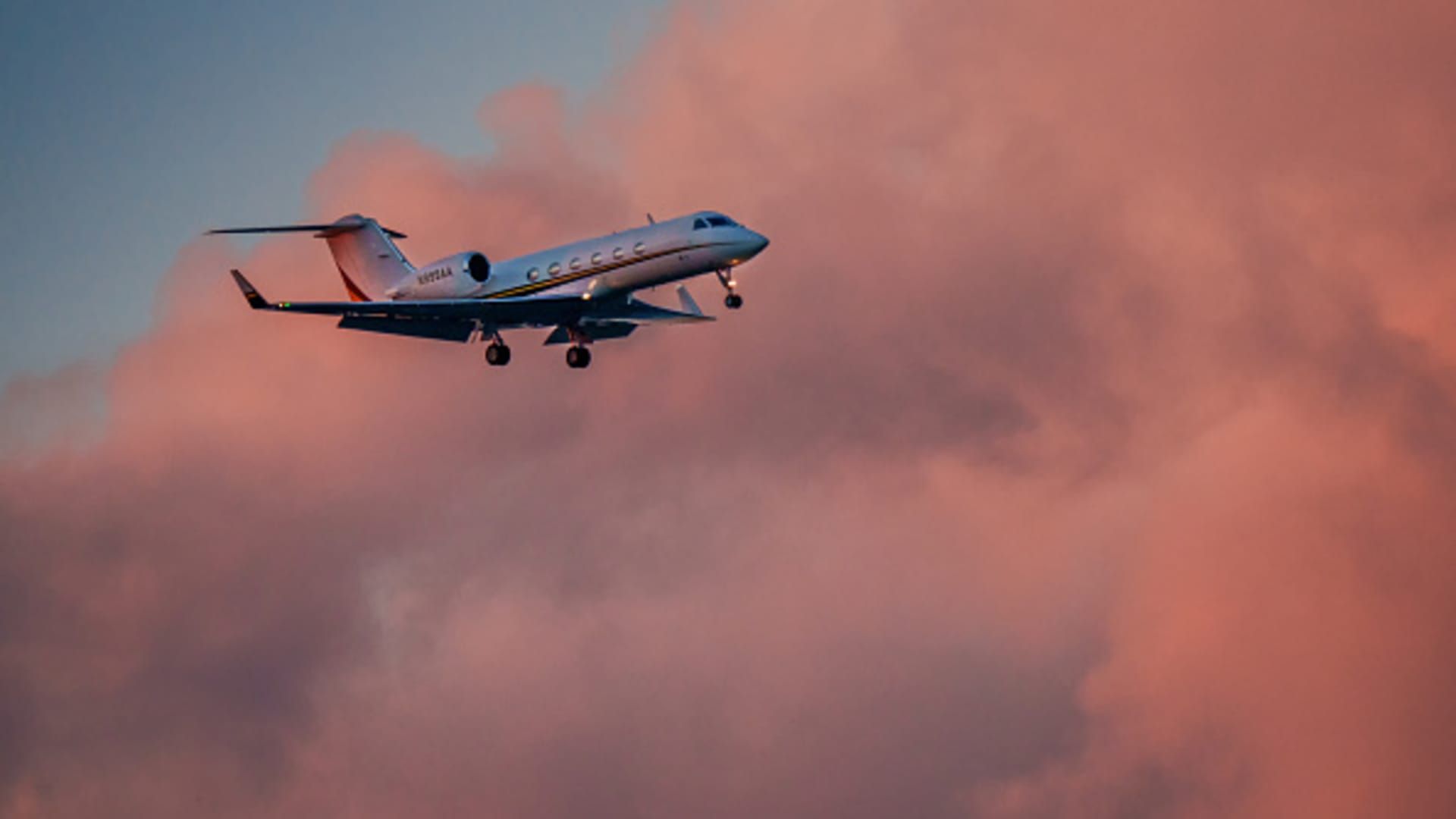A Gulfstream G-IV private jet flies through the clouds at dusk during its approach to Reagan Washington National Airport on June 12, 2024, in Arlington, Virginia.
J. David Ake | Getty Images
A version of this article first appeared on CNBC's Inside Wealth with Robert Frank, a weekly guide for high-net-worth investors and consumers. Register to receive future issues directly to your inbox.
Private jet flights fell 15% in the first half of the year compared with their peak in 2022, as the industry grapples with waning demand and a new competitive landscape for high-end travel.
Despite a brief boost from the Summer Olympics, with a record 713 private jet flights to Paris in the last week of July, the private jet industry continues to lose ground this travel season. Private jet charter flights fell to 610,000 in the first half of the year, down from 645,000 last year and 716,000 in 2022, according to data from Argus International.
The two-year decline highlights the ongoing correction in the world of private aviation, as the number of new jet card members and charter passengers who began traveling on private planes for the first time during the pandemic dwindles. Even ultra-wealthy travelers are showing signs of spending fatigue.
“During the peak, everyone was saying, 'People who fly private for the first time will never fly commercial again,'” said Rob Wiesenthal, chief executive of Blade Air Mobility, The charter and helicopter company. “Well, guess what? A lot of them came back. And they're still coming back.”
The sector is still above 2019 levels, and experts say that if you strip out the aberrant surge in 2021 and 2022, business has continued on its usual growth path. But the post-COVID boom times created a wave of euphoria in the sector, leading to an explosion of IPOs and startups, and a frantic race to secure planes and pilots. Now, many say, all that expansion is setting the stage for a shakeup.
Wheels up, which went public in 2021 via a SPAC, saw its shares plummet more than 90% before Delta airlines stepped in to help rescue the company with an investment and a partnership. Wheels Up has never turned a quarterly profit and last week reported a second-quarter net loss of $97 million and a 29% year-over-year decline in membership.
The company's chief executive, George Mattson, said Wheels Up is making solid progress and that “our work this quarter further solidified our position at the forefront of delivering integrated global aviation solutions that seamlessly blend the previously separate ecosystems of private and commercial travel.”
Jet It, a major U.S. private jet operator, shut down last year after grounding its fleet of Phenom 300s, Gulfstream G150s and HondaJets. VistaJet has faced repeated concerns and media reports about its debt load, though its founder and chairman, Thomas Flohr, told CNBC in May that “all documents and data were always available to our shareholders and debtholders.”
Industry experts say some of the smaller charter operators could soon face tough decisions as fleets sit idle and demand falls.
“The smaller operators, with three, four or five planes, are the ones that are suffering,” said Doug Gollan, founder and publisher of Private Jet Card Comparisons.
Private aviation’s recent challenges and fleeting success can be traced back to COVID-19. In 2020, when airports and airlines shut down, private jets offered an escape and a safer way to fly. Wealthy travelers who had rarely, if ever, flown on private planes due to cost and energy consumption could now justify the isolation at 40,000 feet.
“There was a segment of the population that could afford to fly on private jets, but they were always reluctant because they didn’t like the image it gave,” said Jay Duckson, founder and president of consultancy Central Business Jets. “With COVID, they had a reason to fly on private jets. There was a massive increase in demand.”
The flood of liquidity from government spending, stimulus, low interest rates, and a booming stock market also created record amounts of wealth to pay for the rising costs of private flights. Companies rushed to buy planes, hire pilots, and sign up new members. Prior to 2019, there were only a few months when private jet charter flights exceeded 100,000. In 2021, nearly every month exceeded 100,000, and July 2021 saw flights exceed 300,000.
Demand overwhelmed the industry. Private jet passengers paying six figures for flights began facing delays and cancellations because operators couldn’t buy or lease planes quickly enough. Shortages of pilots and spare parts also grounded fleets.
In 2023, demand began to wane even as more planes and pilots became available. Some wealthy travelers felt they could no longer use Covid as an excuse (for themselves or others) to fly privately. For others, the high prices of private flights simply got out of hand.
“Prices are about 20% higher than they were in 2019,” said Gollan of Private Jet Card Comparisons. “A lot of people are saying, ‘I spent $300,000 or $350,000 on flights last year, I’m not going to spend $400,000 or $450,000 this year.’ Even if they have the money, they have a dollar figure in their head that they don’t want to go over.”
In addition to cutting back on flights, some travelers simply began using commercial flights for easier city-to-city travel, combining commercial and private flights throughout the year. In his latest survey of private jet travelers, Gollan found that 87% “switch between airlines and private flights, depending on where they are flying.”
With demand falling, unsold jets are piling up again and prices are falling. The number of used business jets for sale rose 17% in July compared with a year earlier, according to a report by Jefferies. Prices fell 7%, the report said. While orders for new jets remain strong, wait times have dropped from as long as three or four years to about two years for many models, according to jet brokers.
Many industry executives are celebrating the drop in demand and say the industry is returning to a more balanced equilibrium, with profitable routes, available aircraft and happier customers.
“The industry is on a more sustainable path for the long term,” said Travis Kuhn, senior vice president of software at Argus. “It’s not a bad thing that it’s cooled off a bit.”
Gollan said that while some of the occasional travelers may have abandoned private aviation, the “regular users” are still flying. His survey showed that 95% of respondents who started flying privately during the pandemic are still doing so, and 77% are doing so with a membership, jet card or fractional program.
Industry giant NetJets, owned by Berkshire Hathaway, has also benefited, as more people switched from charter flights to fractional ownership flights due to greater reliability and quality. The number of fractional flights rose 12% in the first half of 2024, to 308,000, according to Argus.
“Some of these new pilots have looked at the market and liked the fractional model,” Kuhn said. “It’s a set amount of hours and a larger fleet.”
Disclosure: NBCUniversal, the parent company of CNBC, owns NBC Sports and NBC Olympics. NBC Olympics holds the U.S. broadcast rights to all Summer and Winter Games through 2032.









